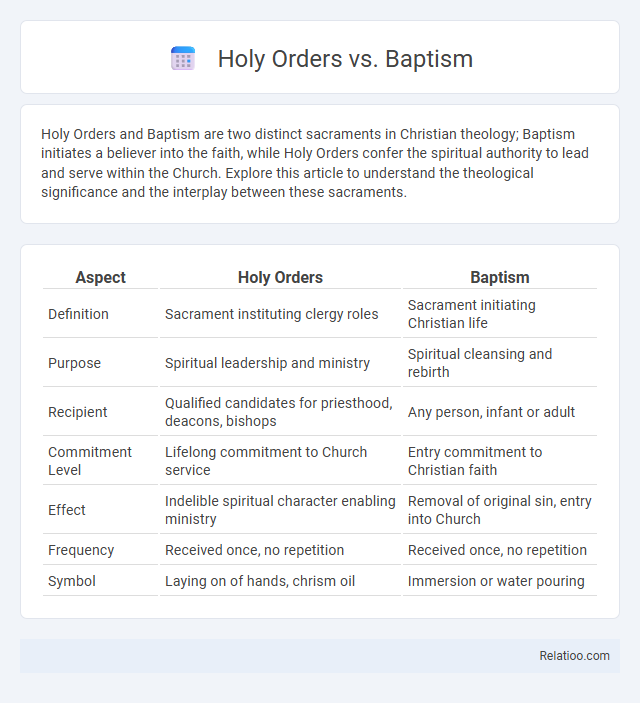Holy Orders and Baptism are two distinct sacraments in Christian theology; Baptism initiates a believer into the faith, while Holy Orders confer the spiritual authority to lead and serve within the Church. Explore this article to understand the theological significance and the interplay between these sacraments.
Table of Comparison
| Aspect | Holy Orders | Baptism |
|---|---|---|
| Definition | Sacrament instituting clergy roles | Sacrament initiating Christian life |
| Purpose | Spiritual leadership and ministry | Spiritual cleansing and rebirth |
| Recipient | Qualified candidates for priesthood, deacons, bishops | Any person, infant or adult |
| Commitment Level | Lifelong commitment to Church service | Entry commitment to Christian faith |
| Effect | Indelible spiritual character enabling ministry | Removal of original sin, entry into Church |
| Frequency | Received once, no repetition | Received once, no repetition |
| Symbol | Laying on of hands, chrism oil | Immersion or water pouring |
Introduction to Holy Orders and Baptism
Holy Orders and Baptism are two fundamental sacraments within Christian theology, each serving distinct spiritual purposes. Baptism initiates believers into the Christian faith by cleansing original sin and marking their entry into the Church community. Holy Orders confer a sacred authority to individuals, empowering them to perform ecclesiastical duties such as leading worship, administering sacraments, and providing pastoral care.
Definition and Purpose of Holy Orders
Holy Orders is a sacrament in Christian theology that ordains individuals into clergy roles, empowering them to perform sacred duties such as administering sacraments and leading worship. Baptism is the initial sacrament of initiation that cleanses original sin and welcomes a person into the Christian community. Your understanding of Holy Orders highlights its purpose to provide spiritual authority and service within the Church, distinguishing it from Baptism and other sacraments that focus on initiation and grace.
Understanding the Sacrament of Baptism
The Sacrament of Baptism initiates Your spiritual journey by cleansing original sin and welcoming You into the Christian community. Unlike Holy Orders, which ordain individuals for specific church ministries, Baptism is a foundational sacrament accessible to all believers that signifies rebirth and commitment to faith. Understanding Baptism's role highlights its essential function as the first step in the Christian sacramental life.
Scriptural Foundation: Holy Orders vs Baptism
Holy Orders and Baptism are distinct sacraments with unique scriptural foundations; Baptism is rooted in Jesus' mandate in Matthew 28:19 to "make disciples of all nations, baptizing them," symbolizing entrance into the Christian community and spiritual rebirth. Holy Orders, established through Christ's commissioning of the apostles in Luke 22:19-20 and Acts 6:5-6, imparts a sacred authority for ministry, enabling ordained clergy to administer sacraments and guide the Church. While Baptism initiates believers into faith, Holy Orders confers a lifelong spiritual vocation directly linked to apostolic succession and ecclesiastical leadership.
Rituals and Symbols in Both Sacraments
Holy Orders and Baptism are distinct sacraments in Christian theology, each with unique rituals and symbols that signify spiritual transformation. Baptism typically involves the ritual of water immersion or sprinkling, symbolizing purification and rebirth, marked by the use of holy water, white garments, and the sign of the cross. Holy Orders, on the other hand, involves the laying on of hands and anointing with chrism oil, symbolizing the conferment of sacred authority and the Holy Spirit's empowerment for ministry; understanding these rituals enhances Your appreciation of their spiritual significance.
Roles and Effects: Clergy vs Laity
Holy Orders confers a sacred role, empowering clergy to administer sacraments and lead the Church, whereas Baptism initiates laity into the Christian community, cleansing original sin and enabling spiritual rebirth. As a Sacrament, Baptism serves as the foundational rite of Christian identity, while Holy Orders signifies a vocational commitment with distinct spiritual authority and responsibilities. Understanding these differences clarifies your role in Church life, distinguishing ordained ministry from baptized membership with unique effects and duties.
Initiation vs Vocation: Theological Perspectives
Holy Orders, Baptism, and Sacraments each hold distinct theological roles, with Baptism serving as the foundational sacrament of initiation into the Christian community, cleansing original sin and marking the beginning of spiritual life. Holy Orders represents a specific vocational sacrament, conferring a sacred office within the Church and empowering ordained individuals to lead and administer other sacraments. Your understanding deepens by recognizing Baptism as universal initiation, while Holy Orders highlights a unique call to service and leadership within the Church's vocational structure.
Requirements and Eligibility for Each Sacrament
Holy Orders requires a baptized, confirmed male candidate who has completed specific theological education and formation, typically within the Catholic Church, and must meet age and moral standards. Baptism is open to any person, including infants, with no prerequisites besides the intent to receive the sacrament and proper catechesis for those of age; it initiates individuals into the Christian faith. Eligibility for receiving any sacrament demands proper disposition, which includes faith and repentance, but Holy Orders involves stricter criteria such as celibacy and vocation discernment compared to Baptism's universal accessibility.
Spiritual Significance and Lifelong Impact
Holy Orders confers a sacred authority for ministry, marking a lifelong commitment to spiritual leadership and service within the Church. Baptism initiates an individual into the Christian faith, cleansing original sin and establishing an enduring spiritual identity as a child of God. Both are sacraments, essential rites that impart divine grace, but Holy Orders uniquely empower ongoing pastoral responsibilities, while Baptism fundamentally transforms personal spiritual existence from the moment of its administration.
Comparative Summary: Holy Orders and Baptism
Holy Orders and Baptism are both essential sacraments in Christian theology, each conferring a unique spiritual grace and role within the Church. Baptism initiates believers into the Christian faith by cleansing original sin and marking entry into the Church, while Holy Orders ordains individuals for specific ministry roles such as deacons, priests, or bishops to serve the community. Baptism is a one-time sacrament of initiation, whereas Holy Orders can involve multiple degrees and is fundamentally tied to ecclesiastical authority and sacramental administration.

Infographic: Holy Orders vs Baptism
 relatioo.com
relatioo.com